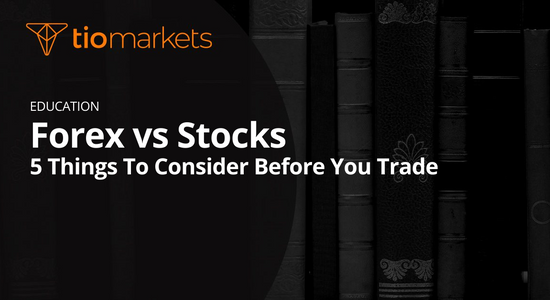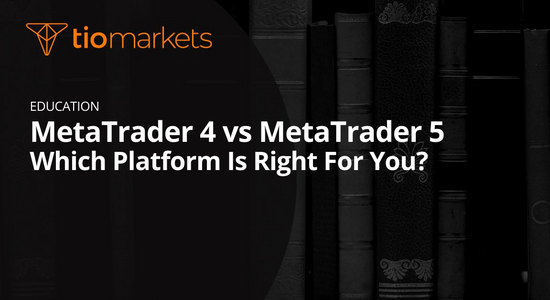Risk disclaimer: CFDs are complex instruments and come with a high risk of losing money rapidly due to leverage. 80% of retail investor accounts lose money when trading CFDs with this provider.
You should consider whether you understand how CFDs work, and whether you can afford to take the high risk of losing your money. Professional clients can lose more than they deposit. All trading involves risk.
Spread Betting vs CFD Trading With TIO UK: What's The Difference?
BY TIO Staff
|April 19, 2022Spread betting and CFD trading share many similarities, but there are also some subtle differences. If you’re reading this, there’s a good chance that you may already know about these two forms of trading. But maybe you aren’t quite sure what the similarities and differences between spread betting vs CFD trading are.
You are not alone, many people have questions and need help deciding between spread betting vs CFD trading. In this article, we are going to compare them and answer the most common questions people have. By the time you finish reading this, you will understand what spread betting and CFD trading is and what form of trading you should choose.
So sit back and keep reading to learn all about it, let’s get started.
Spread betting is only available to TIO UK clients under the FCA regulated entity. Register and start trading today to benefit from the advantages of spread betting.
What is spread betting vs CFD trading?
In recent years, it seems that the popularity of spread betting vs CFD trading has been growing at a fast pace. It’s easy to understand why this is the case. Spread betting allows you to speculate in the financial markets without having to own the assets themselves.
But so does CFD trading, so what’s the difference? Why is spread betting becoming so popular?
Although both types of trading share many similarities, there are a few but significant differences between them. These similarities and differences between spread betting vs CFD trading will be outlined below.
The difference between spread betting and CFD trading
The main difference between spread betting and CFD trading is in how they are presented. They are similar in that you speculate on the price movements of financial assets and you might profit or lose as a result of it.
That’s all well and good, however the way this is calculated varies and the outcome has some other implications, especially where tax is concerned. That is the main difference between spread betting vs CFD trading. There are some other slight differences with the transaction fees but we will get to that in just a minute. For now, let’s see how spread betting and CFD trading works.
How does spread betting work?
In a nutshell, spread betting is a type of trading that lets you speculate on the price movements in financial markets. You don’t actually buy or sell any of the underlying assets, you just bet on whether the price of the asset will rise or fall.
When you place a spread bet, you choose a direction (up or down), open a position (buy or sell) and bet an amount of money per point. Your profit or loss is calculated by multiplying this bet size by the number of points gained or lost in the underlying asset.
For example, let’s say you buy gold at $2,000 per ounce and bet £1 per point. If the price goes up from $2,000 to $2,100 and you decide to close your bet, you would have gained 100 points. So your profit would be £1 x 100 points = £100. But if the price goes down from $2,000 to $1,900 and you decide to close your bet, you would lose 100 points. In this case, your loss would be £1 x -100 points = – £100.
To maintain your bet, you need to ensure that you have sufficient capital in your trading account to absorb any adverse price movements. There will still be a margin requirement, like CFD trading and this will vary depending on the instrument. With TIOmarkets, it can be as low as 3.33% when spread betting on Forex.
That’s simple enough to understand right? Now, every asset will have two prices, a price to buy and a price to sell. The difference between these two prices is referred to as the spread, hence the term spread betting.
How does CFD trading work?
CFD trading (Contracts For Difference) is very similar to spread betting in the sense that you speculate on the price movement of the underlying asset. Except, instead of buying or selling the underlying asset, you trade a derivatives contract that tracks the price of it. Once your deal is closed, you simply pay or receive the difference between the opening and closing prices. TIOmarkets allows you to trade in over 300 different assets but let’s look at an example of a CFD trade in the FTSE 100.
Let’s say the price of the FTSE 100 is at 7500 index points and you decide to buy 10 CFDs. If the price goes up from 7500 to 8000, your profit on the deal will be the difference multiplied by the number of contracts traded. So for this example, it would be 500 index points multiplied by 10 CFD contracts, which equals £5,000 profit. On the other hand, if the price moves down from 7500 to 7000, you would lose the difference, which would be a £5,000 loss. Here is an example calculation for trading the FTSE 100;
BUY 10x FTSE 100 CFDs @ 7500 index points = £75,000 total value.
SELL 10x FTSE 100 CFDs @ 8000 index points = £80,000 total value.
The difference between £80,000 and £75,000 = £5,000 profit.
A CFD is a leveraged product, which means that you only need to deposit a small margin in order to open the deal. For indices trading, this can be as little as 5% and for forex majors; it can be as low as 3.33% of the total value. It’s very straight forward and the platform provides you with risk management tools to manage the trade while it’s open.
Risk management with spread betting and CFD trading
In spread betting, you place one order at a time, very much like CFD trading and you can still place a market order, pending order, stop loss and take profit. But once your trade is executed, your deal is open and you can change it. This means that in spread betting, you can reduce the bet size.
Compared to CFD trading, you can partially sell some CFDs if you are trading in multiples of more than one. This means that you can take some profit off the table or reduce your exposure without exiting the full position. Spread betting, as well as CFD trading provides you with flexibility to manage the trade while it’s open.
A quick summary for spread betting vs CFD trading
They are both similar in the sense that you speculate on the price of assets but the profit or loss is calculated differently. For both spread betting and CFD trading, you are required to put up a small margin to open the trade. Both spread betting and CFD trading allows you to reduce or partially close your position to better manage exposure and risk.
Spread betting tax advantages
One of the main differences between spread betting vs CFD trading is that the former has tax advantages. In the UK, spread betting is *tax-free and it is also exempt from stamp duty on indices or stocks. CFD trading is also exempt from stamp duty however; any profits are subject to capital gains tax.
As a UK resident and depending on your financial status, spread betting can potentially save you money compared to trading in CFDs. This feature makes it very attractive for traders who want to keep a substantial portion of the profits they make from speculating in the financial markets.
Advantages of CFD losses on your tax returns
However, losses made from spread betting cannot be claimed as a tax deduction against income or capital gains tax like they can with CFD trading. This feature of CFD trading is particularly attractive to people looking to hedge the value of real assets.
If you require any further clarification on tax related matters for spread betting or CFD trading, you should seek independent financial advice or speak to a tax consultant. Tax laws vary between countries and may be subject to change.
Trading costs for spread betting vs CFD trading
So now you are probably wondering about the costs of spread betting vs CFD trading. If you’re new to trading, spread betting could be an ideal choice when taking your first steps. Because it is easy to get started and simple to understand, especially when it comes to calculating the costs and risk involved.
In spread betting, the cost to open and close a bet is just the spread. Whatever this is will depend on the spread for the asset and your stake or bet size per point. When trading CFDs, the spread is still considered as a cost of trading but there is usually a separate fixed commission as well.
These trading costs can impact your returns as a trader and they can vary between the two types of trading. Understanding what fees are involved is essential to helping you choose between spread betting and CFD trading. Check our trading conditions page for more information.
Swap fees, dividend payments and expiration dates
Other than the spread and fixed commission, there are also other costs related to the duration of the trade. For both spread betting and CFD trading, there aren’t any expiration dates. Meaning that your bet or deal will close when you choose to close it or by being stopped out.
Then depending on the duration of the trade, a swap or roll over fee may apply. In the case of trading stocks, TIOmarkets will credit any dividends to your account whenever they apply too. This is the case regardless of whether you are spread betting or trading CFDs.
The products available for spread betting or trading
Further to all this, you can still trade your favorite instruments. TIOmarkets provides a range of products that you can spread bet or trade; these include forex, stocks, indices and commodities. For CFD trading, you can still trade on the popular MT4 or MT5 trading platforms from your desktop or mobile. But if you decide to spread bet, it is only available on the MT5 trading platform and you will need to open a new account.
How to start spread betting
If you haven’t already got an account, follow these simple steps to set up and download the MT5 trading platform.
- Register your account
Register your account with TIOmarkets, it only takes a minute. If you are an existing client, you can create your new spread betting account by logging in to your secure client portal.
- Open a demo or live account
Create your demo or live spread betting account, choose the MT5 trading platform and GBP as the base currency when setting it up. The log in credentials will be sent to you by email.
- Download the MT5 trading platform
Navigate to the download centre and download the MT5 trading platform to your computer or smartphone.
- Select your deposit method and fund your account
Then go to deposit, select your deposit method and enter your preferred amount. You can start with TIOmarkets from just £200.
- Transfer funds to MT5
Once you have made a successful deposit, go to manage funds and transfer the funds from your TIOmarkets wallet to your MT5 spread betting account.
- Log in to MT5 and start spread betting
When you log in to the MT5 trading platform, you should notice your balance reflects your deposit.
Now you can start spread betting and now it’s just about time to wrap this article up.
Conclusion
TIOmarkets is a fast growing reputable broker with a reliable online trading platform. Clients receive competitive trading conditions, hassle free withdrawals and a superb trading experience. Now, you can spread bet as well as trade CFDs.
Even though you can do both, what should you do if you could only choose one? Here is an opinion;
Spread betting is simpler compared to CFD trading. All you have to do is decide what to buy and sell and the value of each point before placing your bet. The learning curve is much shorter for spread betting vs CFD trading, since you don’t have to know so much about the contract’s specification. It is great for beginners or experienced traders that just want exposure to financial markets.
The minimum trade size is slightly larger at £0.50 per point compared to $0.10 per pip for CFD trading. So be prepared to make a slightly larger investment with spread betting vs CFD trading. With that being said, the longer term benefits of spread betting are derived from its *tax-free status. It is an unrivalled form of trading in this regard and the amount you could potentially save can be quite substantial. It all depends on your financial status and whether you are a consistently profitable trader or not. Tax laws may be subject to change and be different in your country.
CFD trading is available to everyone, it is ideal for those who want more control over their exposure in the financial markets or if they have a tighter budget. If you prefer trading on MT4 over MT5 or you want your account base currency in something other than GBP, then you should naturally gravitate towards CFD trading.
Now it is over to you, are you ready to spread your bets in the financial markets? Create your account and start spread betting or trade CFDs with a reputable broker today.
*Tax laws may be subject to change
Risk warning: CFDs are complex instruments and come with a high risk of losing money rapidly due to leverage. 76% of retail investor accounts lose money when trading CFDs with this provider. You should consider whether you understand how CFDs work, and whether you can afford to take the high risk of losing your money. Professional clients can lose more than they deposit. All trading involves risk.

Related Posts



